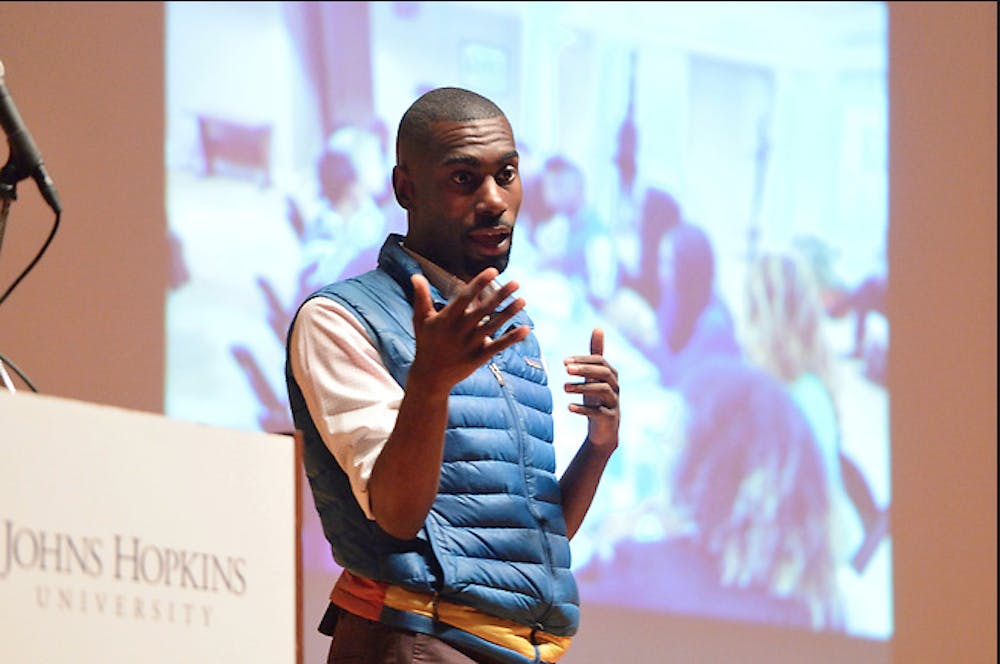DeRay Mckesson, an activist and Baltimore public schools administrator known for his leadership within the Black Lives Matter (BLM) movement, offered suggestions for furthering the movement at the Milton S. Eisenhower (MSE) Symposium on Oct. 20.
He began the event in Shriver Hall by showing tweets and Vines from BLM protests over the past several years.
Mckesson argued that these forms of social media can serve as an important record of what he calls police brutality.
“I don’t normally show clips, but what I’ve come to realize is that people, including me sometimes, have forgotten just how crazy it was two years ago,” he said. “The police trauma that we have faced in protests, that people have faced in communities, is still so present.”
Mckesson explained that BLM is attempting to move beyond awareness campaigns and towards effective political organization.
“In the past two years, people now understand that there’s a problem. We’ve won that battle, but we have not yet created a critical mass of people who know what to do and have the skills to do it,” he said. “We have been slow, in part because the trauma has just been so recent and real. The police keep killing people, and people keep responding to that.”
Mckesson argued that understanding and dismantling white privilege is an essential component of the BLM movement.
“I’ve heard white people say, ‘I worked hard, and my parents worked hard. I didn’t benefit from whiteness,’” he said. “How hard did you work for every band-aid to look like your skin? How hard did you work for
‘nude’ to be the color of you and not me? This is actually what privilege is—the fact that you didn’t have to work hard for these things, that white has become what normal is.”
Mckesson praised BLM for creating a national discussion about what it means to be black in America.
“What we are doing in this space is contesting white privilege, pushing people to think about the complexity of blackness and the complexity of all people of color in a different way, and doing it in conflict,” he said. “One of the most beautiful things about the movement is that we are forcing these public conversations about race and justice and equity, knowing that conversation alone is not enough, that the conversation is the entrance into the change.”
Mckesson discussed his work with Campaign Zero, an organization with the aim to end police violence by targeting structural injustices in law enforcement.
“We believe fundamentally that systems can change culture, that we can change systems in a way that will change police culture. We also believe that systems break in pieces, so part of our work is to try to think about what are the pieces that we can press on so we can make the police change,” Mckesson said.
He argued that police union contracts, for instance, fail to hold police officers truly responsible for any crimes they might commit.
“We created the first public database of police union contracts, and what’s interesting about those is that the police have a set of protections that almost guarantee that they won’t be held accountable in so many cities,” Mckesson said. “Just in Baltimore, when Freddie Grey got killed, the officers have up to 10 days before they can be interrogated after they’re charged with a crime. There’s no private citizen that has that protection.“
Mckesson also argued that Hillary Clinton, although an imperfect presidential candidate, is ultimately the best choice for supporters of Black Lives Matter. He explained that he and other BLM activists had met with Clinton to create a platform for racial justice, and that he planned to meet with her again to ensure that she would uphold her promises.
“The Clintons have been at this for a long time, so one day one she can get into the White House and be able to work more functionally than a lot of presidents have,” he said.
“Hillary cannot win and she cannot govern without black people. If we can show up and prove that we can vote and hold people accountable, I think that’s a different type of power that we can leverage.”
Sophomore Isaac Morales appreciated how Mckesson discussed the role of social media in the BLM movement and the importance it played.
“What stood out to me the most was the Vines that he showed and how he proved that’s what really gets people to understand what’s going on, because otherwise you can’t really express what you’re going through,” Morales said.
Freshman Cecilia Vorfeld was impressed with Mckesson as both an activist and a speaker and appreciated how he brought a different perspective to her view of the world.
“I loved this event. As an international student, I think it’s something I really like about studying in the US, being so aware of the black movement and how important it is here,” she said. “I thought he was a really inspirational speaker, and the examples of the types of people he’s had to deal with and the experiences he’s had showed how committed he is.”
Vorfeld also recognized the importance of moving beyond discussion and towards action.
“I think he really pointed out the important issue of how they’ve won the awareness battle, but it’s now about giving people the means to act,” she said. “I’m sure everyone in that crowd felt, ‘Okay, what do I do? What can I do?’”





